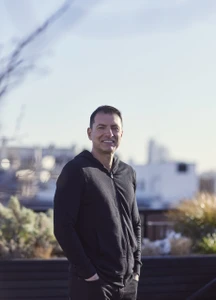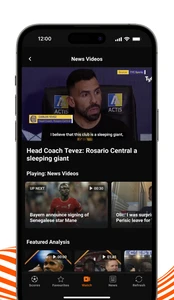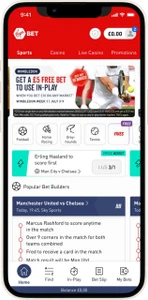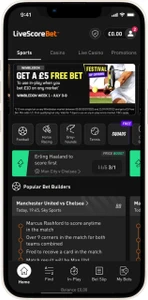“I remember the days when we used to press F5 to refresh the LiveScore.com website. That’s how long back it was,” says LiveScore Group chief executive Sam Sadi.
LiveScore launched in 1998, offering visitors football scores. Gamesys acquired the business in 2017 and, following that operator’s £490m sale to Jackpotjoy Group and then the £2.0bn merger with Bally’s Corporation, LiveScore Group stands alone as an independent business led by Sadi.
The LiveScore Bet sportsbook launched in 2020, complementing the affiliate arm, not to mention its second brand, Virgin Bet. But Sadi isn’t only interested in building a sports betting business.
“We have a plan we’re implementing,” he explains. “You could call it a ten-to twenty-year plan. We intend to become the world’s number one sports media operator.
“Not a betting operator, but a sports media operator.”
Media deals hint at the depth of LiveScore Group’s ambitions.
Back in 2021 in Ireland, the business struck a deal to stream 137 Champions League matches to Irish app users, strengthening its streaming proposition in the market. By the end of the 2020-21 football season, it streamed 1,250 matches across 15 different leagues and competitions in the country.
Sadi has a clear vision for where LiveScore Group is headed and it all centres on convergence.
Convergence is king for LiveScore Group

“What you see today was always the plan,” Sadi says. He joined Gamesys in the wake of GVC Group (now Entain) acquiring his previous employer, Bwin.party, when the business was plotting its route into sports betting.
“We met to discuss those plans and what it would take,” he recalls. “We certainly needed a different strategy and I pitched them convergence from the get-go.”
Sadi even tested the convergence model, where players move seamlessly between the media app and sportsbook, at Bwin.party. Those plans even included a deal for a media product to test the theory.
“I pitched [Gamesys] that idea […] and one of the reasons we did it inside that business was to prevent too many overheads from the beginning, to leverage some of the tech and people Gamesys Group had.”
The intention was always to spin off as a separate operation.
Building a sportsbook to drive convergence
The sportsbook launch has been on the cards since the LiveScore Media acquisition in 2017. Sadi and his team took four years to perfect the product.
“[But] you’re going into a market that’s already saturated, that’s dominated by incredibly strong operators with hundreds, and in some cases thousands, of engineers constantly developing and innovating,” he says.
“Not only do you need a different strategy – which is our convergence business model – but you also have to differentiate on a product level.”
That started with Virgin Bet for LiveScore Group. Virgin Bet was the test case, where Sadi’s team could build a betting product around a brand’s values and strengths.
“Once the acquisition of LiveScore was completed, we started constructing a timeline to make sure when LiveScore Bet came into the market, not only would it be a world-class sportsbook, it would also be the best sportsbook for LiveScore users.”
The convergence-led approach means Sadi’s team aim to answer two key questions. How can they deliver more value as a sportsbook to LiveScore users, while simultaneously delivering media value to bettors?
“That’s how we differentiate ourselves for Sky Bet or Bet365 users who need a separate media app for that total sports experience.”
Creating an ecosystem that still serves industry partners
The sportsbook launch changed the game for LiveScore – the media app operates on an affiliate model. It does so very successfully, with more than 50 million monthly users globally.
LiveScore launched 22 years before the sportsbook. LiveScore Bet followed 22 years later, adding an in-house competitor to a roster of existing operator partners. How is Sadi striking a balance between using sportsbook marketing to drive eyeballs to the proprietary product, while acting as an affiliate to other sportsbooks?
“It’s all about continuing to deliver value,” he says. “We strive to deliver that value to both our users and advertising partners,” he continues. “We’re only operating [LiveScore Bet] in four countries right now; we have all of the markets where we are not yet live.”

All the learnings, developments and innovations, therefore, benefit sportsbook and advertising partners across multiple markets.
“It’s a beneficial relationship. As long as we continue to do that, they’ll continue to be our partners. If we see that we have to become a single-brand ecosystem, we may have to go in that direction. But I don’t see that happening in the near future.
“We have a lot of users, a lot of inventory and, if our partners are happy with us, we’ll continue to deliver value to them.”
Competition and compliance challenges
Sadi is particularly bullish about the convergence model because he sees few companies capable of catching up. “We’re so far ahead of what our competitors are doing that we don’t mind visibility and transparency,” he says. “In a way, we’re debunking a lot of claims about convergence and how it could work.”
It goes much further than running a media brand and tacking on a sportsbook. “We’ve seen in the past how those ventures have failed,” he notes.
LiveScore Group’s technology investment far outstrips companies of a similar size, Sadi continues. His “tremendous” team of more than 350 working on product and technology safeguards against potential regulatory headwinds.
Sports betting sponsorship bans and advertising restrictions could separate the sports from the betting. Sadi, however, believes the technology and product focus makes LiveScore Group flexible enough to adapt to regulatory change. “We’re not seeing it as headwinds, but an advantage in a changing environment where we can be more flexible.”
LiveScore is age-gated already, for example. The volume of customer data, across media and betting consumption, means it has a deeper understanding of customers. That means there’s more data to prevent harm and problem gambling. “We see it as an edge for ourselves as more regulation comes in.”
Betting isn’t the endgame for LiveScore Group
That competitive edge sets LiveScore Bet up for success in real-money betting. However, the sportsbook is just a step on a longer journey.
There’s a strategic roadmap and Sadi is following it slowly and deliberately. He’s not afraid to say no. LiveScore Group did not rush its sportsbook launch, spending four years on the project. That means new opportunities have to really dazzle him if he is going to deviate from that path.
“We’ve said no to massive projects like entering the US,” he reveals. “We’ve been presented opportunities with hundreds of millions in investment, with an eye to a listing or a SPAC combination. We’ve run the numbers, decided we’d be burning capital and said no.”
Crazes such as NFTs, the metaverse and web3 were all similarly dismissed “because the maths just didn’t add up”.
The focus remains that masterplan, to become the world’s number one sports media operator.
“Betting is content that helps us finance this, to monetise our business model,” he explains. “Being able to say no to ventures where we don’t have a strategic edge but just sounds good or gets us capital investment, has been a positive for us.
“We’re a private company relying on a handful of shareholders to finance the business. We’ve been quite conservative in how we allocate capital.” The business must be selective where it invests, he adds, and ensure it delivers ROI.
Becoming a media behemoth
That discipline will be vital as it looks to ramp up its media presence. Rights deals don’t come cheap, with fees stretching into billions.
That makes sports betting a crucial component, Sadi argues. “I think it is always one of the best sources of income for a sports media property.”
Therefore, markets offering an opportunity to launch regulated betting, or to partner with a local brand, are priorities. The scope to launch live streaming certainly helps.
“Live is tricky,” he admits. “You have to pick your spots.” Competitors with deep pockets distort the media rights landscape. UK broadcast rights for the Champions League sold for £1.2bn in 2019 when telecommunications giant BT entered the running.
Now, the likes of Amazon and Apple are muscling into the space, pushing prices upwards.
LiveScore must pick its battles. “We’ve done well with the Champions League in Ireland,” Sadi says. “We understood what it takes for us to be successful in that space and I’m pretty sure it’s going to be relevant for us in the future.”
In a convergence-driven model, what sort of impact has that had? Sports betting was up over 100% last year, and LiveScore’s audience doubled. If it achieves the same success in Nigeria, the UK and the Netherlands, Sadi may be closer to proving the model.
Next up: Nigeria and Bulgaria
“We’re very positive about Ireland, but Eastern Europe and Africa are our next big expansion opportunities,” he adds.
LiveScore Bet Nigeria was the operator’s first sportsbook launched three years ago. “Nigeria was all about getting our product right, operations ready and waiting for the market to shift from retail to online.
“That shift has started accelerating, so this is the period where we’re going to start investing a lot more into Nigeria.” LiveScore Bet Netherlands is two years in and Bulgaria is next on the roadmap.
As more markets come into LiveScore Group’s horizon, it continues to slowly but carefully ramp up.
Sadi and LiveScore are pioneering the convergence model. As it begins to realise its vision, the operator is emerging as a formidable proposition. But Sadi is not rushing as he builds to first place in the sports media market.
Original article: https://igamingbusiness.com/strategy/livescore-group-ceo-sam-sadi/


















